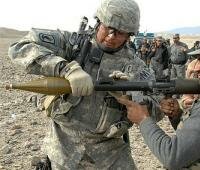Climate change, conflict and fragility: understanding the linkages, shaping balanced responses
Issues:Climate change, Competition over resources
In this recent article, Janani Vivekananda, International Alert's Senior Climate Policy Advisor on climate change and security, turns her attention to the negotiations in Copenhagen. She argues that any global agreement must address the links between climate, conflict, governance and development; yet issues three cautions in doing so.
Photograph: Opening Ceremony of UN Climate Change Conference, Miguel Villagran/Getty Images
Read more »Posted on 14/12/09
Climate change and conflict: lessons from community conservancies in northern Kenya
Issues:Climate change, Competition over resources
In November 2009, Saferworld, the Conservation Development Centre, and the International Institute for Sustainable Development launched a new report on climate change and conflict in Kenya. "The theoretical case for the connections between climate change and conflict has been well articulated, but we're still learning how this relationship manifests itself in practice," said Ivan Campbell, Senior Advisor on Conflict and Security at Saferworld. "This study tests that theory against realities on the ground in Kenya - and then makes practical and targeted recommendations in response to the actual policy context".
Read more »Posted on 1/12/09
Global Security after the War on Terror
Issues:Climate change, Global militarisation, Marginalisation
This paper examines the context of the decision to go to war after 9/11 and the anticipated results. It goes on to analyse the actual consequences and seeks to explain why they have been so radically different to original expectations by the United States and its closest coalition partners such as the UK. The paper then updates the analysis of the major global challenges that Oxford Research Group has previously discussed and the need for a new paradigm focused on sustainable security. It concludes by assessing how the experience of the eight years that have followed the 9/11 atrocities might make a change of paradigm more likely.
Read more »Posted on 1/12/09
The climate peril: a race against time
Issue:Climate change
 The approach to the United Nations climate-change summit in Copenhagen on 7-18 December 2009 is mired in controversy as blocs of states vie with each other to determine the real agenda. The multiple interests involved range from elite trading-networks and powerful oil-producers to small-island states in the global south. The underlying reality is a deep-seated inequality in bargaining-power in which the United States and leading European Union member-states can assemble delegations of a hundred or more specialist advisers, whereas the poorest states may have two or three diplomats with no special help. The stark injustice is reinforced by the fact that the climate dynamics of the world’s environment put the majority world most at risk.
The approach to the United Nations climate-change summit in Copenhagen on 7-18 December 2009 is mired in controversy as blocs of states vie with each other to determine the real agenda. The multiple interests involved range from elite trading-networks and powerful oil-producers to small-island states in the global south. The underlying reality is a deep-seated inequality in bargaining-power in which the United States and leading European Union member-states can assemble delegations of a hundred or more specialist advisers, whereas the poorest states may have two or three diplomats with no special help. The stark injustice is reinforced by the fact that the climate dynamics of the world’s environment put the majority world most at risk.
Originally published in Open Democracy. Image taken from New Scientist.
Read more »Posted on 24/11/09
Multiple Futures Project - Navigating Towards 2030
Issues:Competition over resources, Global militarisation, Marginalisation
In March 2008, the Supreme Allied Commander Transformation called for NATO to consider "that different views of future worlds will strengthen our endeavor to develop a more rigorous and holistic appreciation for future security challenges and implications for the Alliance."
The result, a Multiple Futures Project (MFP), acknowledges that in a rapidly changing global security environment, the landscape we know may be very different in 2030. It puts forward four plausible worlds upon which structured dialogue on risks and vulnerabilities can occur: Dark Side of Exclusivity, Deceptive Stability, Clash of Modernites, and New Power Politics.
Read more »Posted on 23/11/09
Climate Change and the Military
Issues:Climate change, Competition over resources
 The Climate Change and The Military (CCTM) Project, based on the co-operation of a group of leading think tanks, "will orchestrate a strong message from the security sector to the December 2009 climate change negotiations taking place at COP 15 in Copenhagen" according to Tom Spencer, the CCTM Project Coordinator (pictured left).
The Climate Change and The Military (CCTM) Project, based on the co-operation of a group of leading think tanks, "will orchestrate a strong message from the security sector to the December 2009 climate change negotiations taking place at COP 15 in Copenhagen" according to Tom Spencer, the CCTM Project Coordinator (pictured left).
A recent report for the CCTM "aims to describe the state of the current debate on climate change and security, and provide a framework for discussion in which the military can play a clear role in the debate on climate change mitigation and delivering sustainable human security, while starting to address the direct impacts of climate change on its core aims of national security, regional and global stability."
Read more »Posted on 18/11/09





